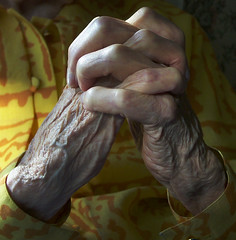Tuesday, 27 February 2007
A question for the "Emerging Church"
Don’t worry what others will think about you.
All too many people are stuck because they’re worried what others may think. The truth of the matter is that others are mostly doing what we all do most of the time—thinking about themselves. They aren’t concerned with you at all. A lot of the time, they aren’t even aware of your existence. So if, from time to time, they drag themselves away from self-absorption just long enough to disapprove of whatever you’re doing, ignore them. It’s your life, not theirs. Self-doubt and fear of embarrassment are major dampeners on any kind of fun. Throw them away. They aren’t worth the time of day.
Monday, 26 February 2007
" .. you will have issues .."
Think about it...
It took me a long time to learn that God is not the enemy of my enemies. He is not even the enemy of His enemies.
—Martin Niemoller
Sunday, 25 February 2007
Afraid ..
Afraid we are nothing, we want everything. Severed from the ways in which we make ourselves, confronting our own creative power as an alien force that ceaselessly threatens to overwhelm our identities, we are driven to construct worlds of our own in which we can maintain the fragile illusion that we are independent beings.
An excised portion (by Lenin) from Marx's Theses on Feuerbach
Thursday, 22 February 2007
Take a risk?
Courage is not the absence of fear, because we are all afraid.
Courage is the belief that there is something more important than safety.
When Jesus sent out his 12 disciples in Matthew 10, he asked them to walk away from safety - to be adventurous, to take risks, to put themselves in new situations where they needed God and other people, to leave security and go to dangerous places.
When was the last time you did something risky?
Two thoughts from "Slow Leadership'
Today’s media-driven, action-obsessed organizations are losing sight of the reality that sheer effort often goes unrewarded, unless it’s directed by some careful, complex, and time-consuming thought. Busyness and thoughtfulness are poor companions. Until organizations stop assuming greater effort is the simple answer to every problem, people will continue to work harder and harder for the same meager results—or none at all.
We live in a culture where action is highly prized and thought is seen as either pointless or suspicious. I’m not sure why this should be so. Of course, powerful rulers have always been suspicious of those whose motives and actions they can neither quite understand nor easily control. The bluff man of action was relatively easy to deal with. The quiet schemer was always the greatest threat. That’s why it paid to keep the cleverest people where you could see them, and deny education, and the leisure to think, to as many people as possible.
Tuesday, 20 February 2007
Lent 1
(Kylie Crabbe article in "Eureka Street" magazine)
Ash Wednesday & Lent
The work of Lent is to rewrite the story by enlarging our capacity to take in the parts that we always want to leave out - the parts that aren’t so pretty, that make us less heroic but more real. If I had what he has, I would be? Him, not me. If I was famous I would still be me, only famous, with another set of large problems.
As someone wrote, in a different context, in "The Age" last weekend "If I had a new lover then I would be? Blissful, for awhile, and then he, too, would probably neglect to pick up the towels in the bathroom."
I know I may appear to be making light of it, but we know how much we have to accept about ourselves, all the hard truths, that will cause us to enlarge our own humanity, and write a new, and I would say, a better, story.
In Lent, accepting the ashes will enlarge our capacity to suffer. And, of course, with that work will come an enlarged capacity for joy.
Monday, 19 February 2007
Friday, 16 February 2007
Where is Christianity authentic?
Wednesday, 14 February 2007
Think about it ...
Not easy this one ..
Blessed is he who can love all people equally...always thinking good of everyone.
—St. Maximos the Confessor (seventh century)
Could you outline some of your failings?
At a lecture given by a world-renowned and very high-brow artist, a friend asked in the Q&A afterwards "It's been great hearing about your work, could you outline some of your failings." The guy was floored. But his answer gave more insight into his work than 3 hours of talks about his great work ever could. Failure is far more interesting than success. And far more important too. A corrective to the spun-sugar culture that inflates importance.
Practising "Conscious Incompetence"
“Conscious Incompetence” is doing something that you know you can’t yet do, let alone do well, for the purpose of learning how to do it better. It’s allowing yourself to make a mess and get things wrong, because you’ll never know how to do better until you get past that point. And it’s the basis of all learning. If you can’t allow yourself to make mistakes and probably look silly doing it; if you can’t allow yourself to attempt what you know you won’t be able to do at first; if you can’t allow yourself to take the risk of screwing up; then you also can’t allow yourself to learn or develop.
Tuesday, 13 February 2007
Rather than add a "comment"
So, here's the beginning.
The CEO "concept" can 'fit' within a Christendom model because it too bases itself in Greek, rationalist, linear-logical, analytic processes. These are about becoming more precise, more discriminating, more specialist, and the related infrastructures include clearly defined authority/power roles, insiders and outsiders, and where the opinion of experts counts the most. A problem is, this begins to sound more like the limited accessibility of Gnosticism (where “only smart people count” and “you must prove you are worthy before entering the next stage”) than the universal accessibility of following Jesus Christ.
For holistic, interconnected, organic network kinds of thinking (typical in non-Western and non-paradoxical cultures), the overall organizational systems seem to be far less hierarchical, or based on hyper-specialization than traditional Western analytic/linear/”logical.” They tend to recognize more complementarity among diverse elements, and perhaps more “flatness” and networks and movements in their organizational systems. A problem is, all the human issues of power and control are still intact.
Meanwhile, the paradigms of the West are flipping back to pre-Christendom processing styles, or to fused East-West styles. Both of these organic or mystical approaches tend to favor symbiosis (relational connections as integration points), or paradox as integration points. These inherently support “flat structures,” not our typical churchy pyramid infrastructures. Dean Eland makes a good point re all of this (some of my ideas come from that direction) with his discussion on 'networks' in www.urbannetwork.org.au
The lands of the West are "scorched" (and the current Australian drought provides some good imagery - although we'd really love lots of rain!) and “we” (Christendom churches/leaders) ourselves have done this. Time now for new paradigm possibilities to move in that may have been dormant, waiting for their providential moment. We just need to be sure that we develop Christ-honoring structures atop these paradigms, lest we make a similar mistake to Christendom, only now in a different direction.
Feeling a bit "off-side"
Just a few "wandering thoughts" from me as I contemplate my (emphasis to be noted) experience of how I see sections of the Church (read our denomination in particular) organising itself "in the world".
Spin is “in” and style is more important than substance. Management, evangelism, worship are blurring into one another.
Does it matter?
Yes, for me it does. Imitation may be the sincerest form of flattery, but it’s an abandonment of reason. In the search for answers to our declining church base I feel we are swinging to the words or actions of the fashionable in places or with people who "matter" (?!). Reality is being lost and truth is being subordinated to a the plot-line of the "successful churches". it seems you’re either a trendsetter, a "wannabe" or a nobody. What perhaps worked for one congregation in one set of specific circumstances is inflated into almost sacred dogma.
There’s an enormous waste of time and resources involved in chasing some fashionable approach that is soon dropped or discredited. It’s fair to say that most vogues and fashions in church life later prove to be ineffective, instant nostrums for much more highly complex problems. Many fashions in church life are based on flimsy evidence. Changes in leadership personnel swiftly lead to sudden re-evaluations in strategy. Each newly-promoted leader/ leadership seeks to establish his or her territory and power through a new gospel: a fresh truism dusted off and brought out of the closet, then championed with as much vigor as was seen for whatever was the orthodoxy under the previous incumbent. Is it any wonder that, for many congregations, long-term strategy is less a focused progress towards an encounter with the living and gracious Christ than a series of unexpected U-turns and diversions.
In Ancient Greece, writers like Aeschylus, Sophocles and Euripides probed the causes of tragedy and the downfall of rulers and heroes. Their understanding was summarized in a single sentence: “Those whom the gods wish to destroy, they first make mad.”
Some of our church planing & management today seems dangerously close to meeting that definition too. It’s time to slow down and allow the gentle presence of the Holy Spirit to take the place of mindless imitation, and reflection to take the place of “shoot-from-the-hip” action.
Monday, 12 February 2007
Sunday, 11 February 2007
Friday, 9 February 2007
Bob Roberts on church and mission:
9 Things I'm Learning and Unlearning
I'm learning … that mission begins with Christology not ecclesiology. Following Jesus leads us to mission, which leads to churches gathering.
I'm unlearning … my assumption that starting churches naturally leads to mission. It doesn't. Churches default to self-focus unless a commitment to be like Jesus in the world comes first.
I'm learning … that being glocal means decentralizing power, decision making, information, all of it. The kingdom of God means ministry opportunities are available to almost everyone.
I'm unlearning … the American church's traditional focus on a super-star speaker, worship leader, educator, and shepherd, which serves mainly to attract spectators rather than igniting the power of everyone else.
I'm learning … that we serve not to convert but because we have been converted. We serve because Christ has changed us and made us servants to people who are hurting and lost.
I'm unlearning … the assumption that "Christian" is defined primarily as acknowledging a moment of conversion. Becoming a follower of Jesus depends on what happens after that.
I'm learning … to love people, which means to see them healed, educated, and given the same opportunities that we have.
I'm unlearning … that the Christian faith is all about heaven. I believe the church has denied the future by just waiting for the Second Coming. We need a story that includes the future.
I'm learning … the kingdom will be established not by human power or entertainment, but by realizing God's concern for humanity and the whole of society.
Making disciples - engage the world
Discipleship is more than urging conversions, signing people up for Bible study, and recruiting workers for church programs. The greatest tool for making disciples is getting people to engage the world.
Wednesday, 7 February 2007
Considering "Belief"
Belief is often hailed as something important, even praiseworthy. I’m not so sure. After all, a belief is generally a second, or even third best way of looking at a situation. Let’s set aside whether any particular belief is widely assumed to be true or not. It doesn’t much matter, since to remain a belief it has to be unprovable. Once you can prove a belief is true, it becomes a fact. It you prove it’s false, it becomes a lie. Either way, it stops being a belief. If the best kind of knowledge is a provable fact, the second best is probably having a hypothesis that is capable of proof. That makes a belief—an unprovable opinion—third best, one step above not having any kind of knowledge at all.
Think about it ...
Only in heaven will we see how much we owe to the poor for helping us to love God better because of them.
—Mother Teresa
Andrew Jones - 'What did you go out to see?'
'you don't need eyes to see you need vision'.Jesus' disciples had to be taught how to see. The disciples saw the clean robe of Jairus; Jesus saw the stained garment of a bleeding woman. The disciples saw a prostitute groveling at Jesus' feet; Jesus saw a servant preparing his body for burial. The disciples saw a threatening alien force teaching in Jesus' name; Jesus saw more partners for the harvest. Jesus saw a woman giving two coins, illustrating the mysterious generosity of Kingdom economics; the disciples would not have seen anything at all if Jesus had not pointed her out.
http://www.christianitytoday.com/bc/2007/001/16.32.html
Tuesday, 6 February 2007
Fear in the church culture
A thought on "compassion"
In order to free us for compassion toward others, Jesus calls us to accept His compassion in our own lives, to become gentle, caring, compassionate, and forgiving toward ourselves in our failure and need.
—Brennan Manning
Friday, 2 February 2007
To look where you haven't looked
There once was an Indian medicine man who made hunting maps for his tribe. When game got sparse, he'd put a piece of fresh leather in the sun to dry. Then he'd say a few prayers, fold and twist it, and then smooth it out. The rawhide was now etched with lines. He marked some reference points, and a new map was created. When the hunters followed the map's newly defined trails, they usually discovered abundant game.
Moral: by letting the rawhide's random folds represent trails, he pointed the hunters to places they had not looked.
Thursday, 1 February 2007
Praying for Peace
Converting from "consumer faith"
"branded" by katherine turpin.
The sub title is adolescents converting from consumer faith. Turpin expresses a very clear perception of the power of consumer culture in the formation of and funding the imagination of young people. Turpin takes John Wesley's notion of ongoing conversion and applies it to the challenge of how to help young people's imagination be formed by the alternative of a Christian faith that runs counter to a culture predicated on the logic of consumption. I'm sure that is a huge challenge for any one working in youth ministry, and probably pre-teen children's ministry too. The danger is , and I've experienced it happening in and outside of 'church', is that with good intentions with respect to their elders, young people just hear adults rubbishing their world. I heard it only the other week with an adult pouring scorn on a pre-teen having & using an 'ipod'. Meanwhile that pre-teen, and young people, can't help but notice that those very same adults seem to be living quite nicely in a consumer culture with their holidays & overseas trips & all the rest.













